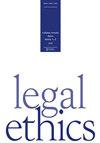Insolvency law’s limits on the disciplinary powers of professional regulators: an update from Canada
IF 0.3
Q1 LAW
引用次数: 0
Abstract
Professional regulatory bodies can be empowered to suspend a regulated member’s licence, pending payment of a fine or costs award made against the member. Previous case law from the Alberta Court of Appeal suggested that a regulated member could not avoid this manner of licence suspension by making use of insolvency proceedings. This precedent appears to have been overtaken by two recent Supreme Court of Canada (‘SCC’) decisions. These recent decisions on insolvency law limit the ability of professional regulatory bodies, including legal regulators, to discipline their members. The cases – Alberta (Attorney General) v Moloney (‘Moloney’) and 407 ETR Concession Co v Canada (Superintendent of Bankruptcy) (‘407 ETR’) – involved licence suspension provisions, which allow regulators to deny an individual the benefit of a licence until the individual pays a specified debt. The SCC was asked whether a regulator could continue such a suspension once the underlying debt had been discharged (that is, released) in bankruptcy. The SCC answered ‘no’. This update describes the prior precedent, how it has been overtaken by the 2015 SCC decisions and how Canadian professional regulatory bodies can continue to protect the public and maintain the integrity of their professions within the constraints set by insolvency law.破产法对专业监管机构惩戒权力的限制:来自加拿大的最新情况
专业规管机构可获授权暂停受规管成员的牌照,直至该成员缴付罚款或讼费。艾伯塔省上诉法院以前的判例法表明,受监管的成员不能通过利用破产程序来避免这种执照暂停的方式。这一先例似乎已被加拿大最高法院(SCC)最近的两项裁决所取代。最近关于破产法的这些决定限制了包括法律监管机构在内的专业监管机构对其成员进行惩戒的能力。阿尔伯塔省(司法部长)诉Moloney(“Moloney”)和407 ETR特许权公司诉加拿大(破产监管机构)(“407 ETR”)这两起案件涉及许可证暂停条款,允许监管机构在个人支付特定债务之前拒绝个人许可证的好处。SCC被问及,一旦相关债务在破产中被解除(即被释放),监管机构是否可以继续这种暂停。SCC的回答是“不”。本更新介绍了先前的先例,如何被2015年SCC的决定所取代,以及加拿大专业监管机构如何在破产法规定的约束下继续保护公众并保持其专业的诚信。
本文章由计算机程序翻译,如有差异,请以英文原文为准。
求助全文
约1分钟内获得全文
求助全文

 求助内容:
求助内容: 应助结果提醒方式:
应助结果提醒方式:


